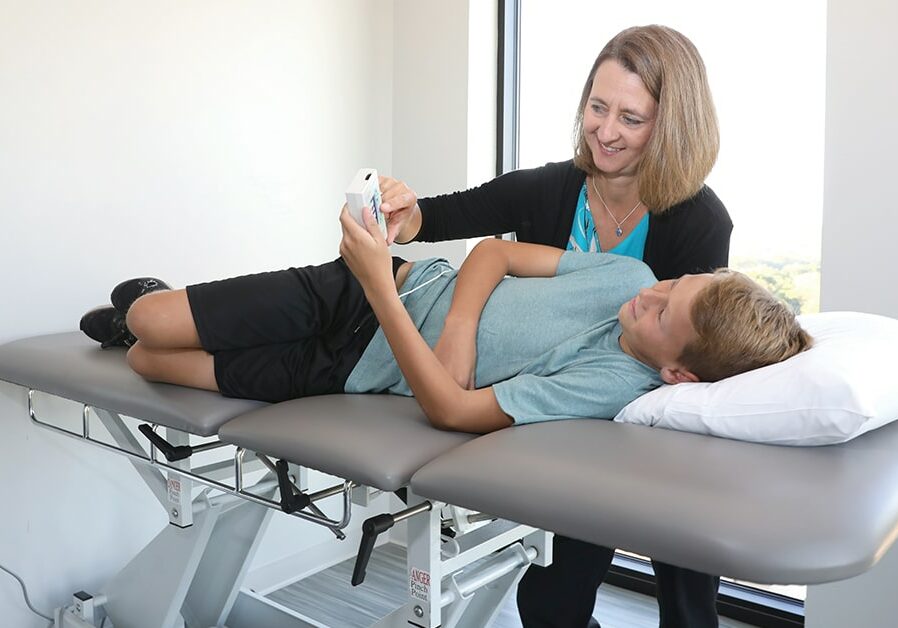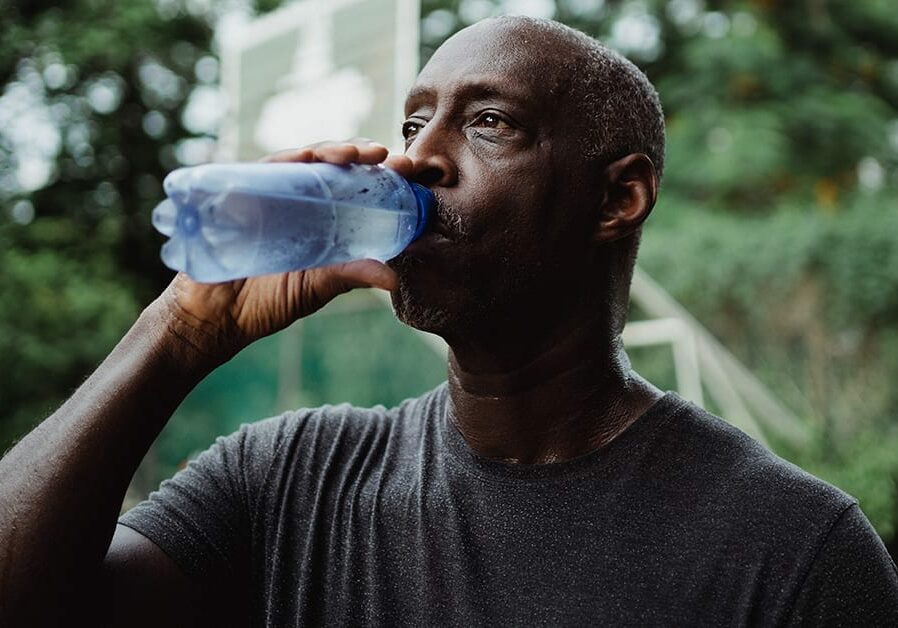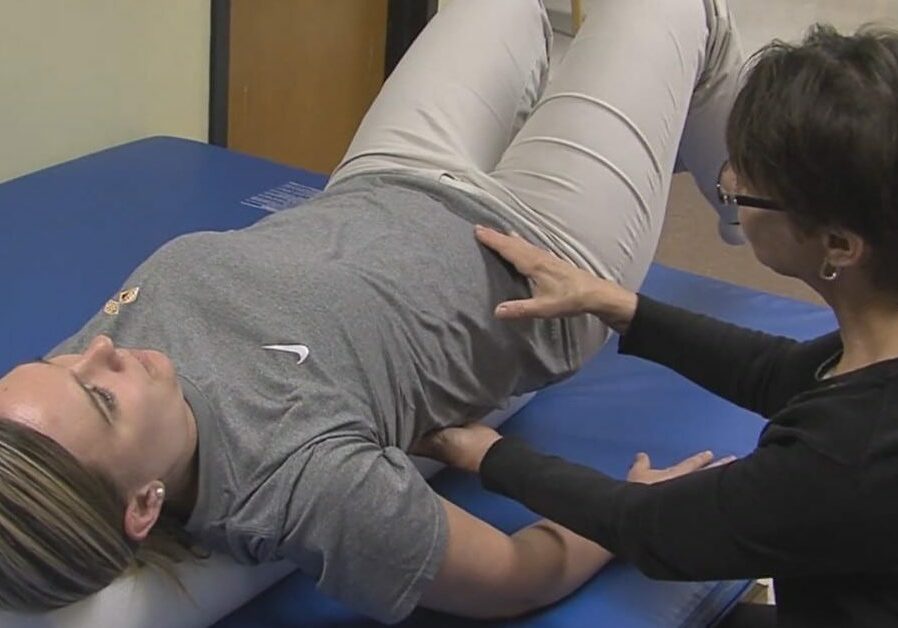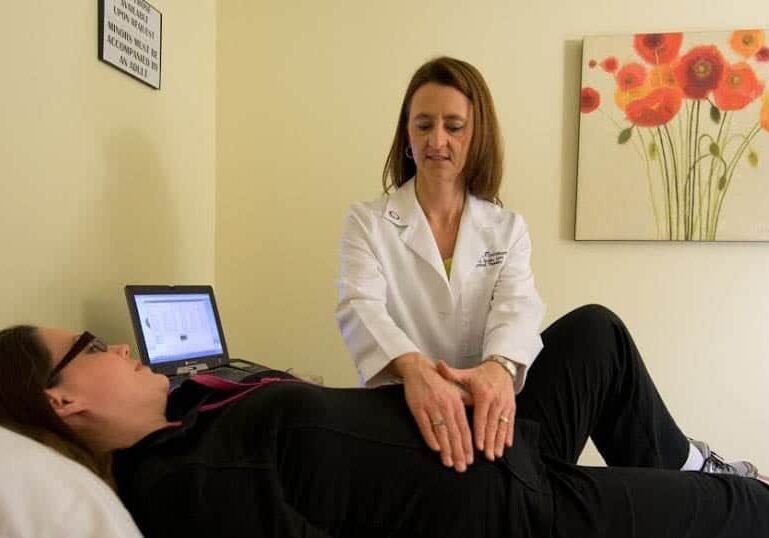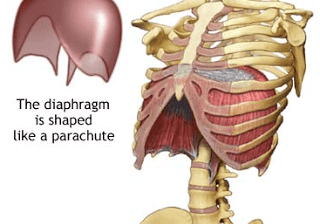Pelvic health and biofeedback
Disorders of the pelvis include pain, urinary and bowel dysfunction. We understand these issues are personal and private. Our therapists have special training in the assessment and treatment of these disorders and will provide you with trauma-informed and equitable health care. On your initial examination, your therapist will ask you questions related to frequency of urinary or bowel elimination, diet, exercise and effect on functional activities.
What is the pelvic floor?
The pelvic floor consists of muscles at the bottom of your pelvis that help hold up your bladder and close off the bottom of your abdominal cavity. The abdominal cavity is like a can: it is closed on top by your diaphragm, in back by your spine and back muscles and in front by your abdominal muscles. These pelvic floor muscles are unique in that they should be able to relax and stretch down as well as lift for contraction, almost like a trampoline. This ability to contract and relax is important in understanding what dysfunction is and how it can be problematic. The pelvic floor also closes off the urethra, helping hold urine in.
Is pelvic floor dysfunction affecting you?
Fill out our pelvic health screening questions to see how we can help you get back to feeling and functioning your best.
Treatable pelvic health issues
What does a pelvic examination include?
Physical examination will include palpation of your abdomen, pelvis, groin, low back or hips, muscle strength assessment of your trunk, hip and groin muscles (the pelvic floor), and movement of your hips and spine. Therapists are trained in internal examination of the pelvic floor which assist with bowel and bladder control and are often tight or weak with pelvic pain, urinary incontinence, and bowel dysfunction. Additionally, our therapists are specially trained in the use of Electromyographic Biofeedback to assist with assessment of muscle tone of the pelvic floor muscles.
Treatment plans
After assessment, an individual plan of care will be set up with the patient. Treatment may involve muscle re-education with Biofeedback to strengthen or relax the pelvic floor muscles, manual therapy, strengthening to the abdominal, hip or pelvis muscles, education, and behavior modification techniques. We want to achieve your desired goals in a caring and supportive environment.
| Appointments | 515-271-1717 |
|---|---|
| Hours | Monday - Friday from 7 a.m. to 5 p.m. |
| Location | 3200 Grand Avenue, Des Moines, IA 50312 |
“I spent many years suffering unknowingly from pelvic floor dysfunction and doctors could not explain my pain. When I would ask them why I had pain, they would answer “I don’t know.” It wasn’t until I met the amazing Kari Smith that I gained answers, information, a treatment plan and hope. Kari operates from a trauma-informed and empowering approach. Kari was extremely patient with me throughout my treatment and celebrated every small victory with me along the way. I have never been so excited to feel so normal! I recommend Kari and DMU PT to everyone!”
Clinic Patient
Physical therapy treatments for pelvic pain
It is estimated that over 25% of cis-gendered women and 17% of cis-gendered men will experience pelvic pain at some point in their lives, and if you find yourself somewhere within that statistic, know that you are not alone. Pelvic […]
Constipation and kids: physical therapy can help
As a mother, I know first-hand how awful it is when your child can’t poop. The struggle is real and is common in many households with kids holding their stool, for a variety of reasons. Connecting with the right professionals […]
What is pelvic floor dysfunction and how can physical therapy help?
Consider this: Other than our feet, which support us in standing and walking during the day, the pelvic floor is the next most complex system in the human body that also runs parallel to the floor. The pelvic floor includes anything […]
Male Incontinence and Prostate
General information on pelvic health for males is more difficult to find than for females, and guys certainly don’t sit around the coffee shop talking about their urinary incontinence after having prostate cancer. However, information should be available since prostate […]
Potty training tips for when your child wets their pants
Potty-training is fun, said no one ever. Arguably some of the most frustrating and expensive parts of raising a child stem from the potty-training process. The trick to potty-training is waiting on the readiness of the child, and it’s important, […]
Let’s talk about sex…ual dysfunction?
Sex. A topic that for myself, personally, growing up was not a topic of conversation in our house. Yes, I had sex education courses throughout school that taught basic anatomy and the general logistics of what sex is. My sex […]
Running Incontinence and the Pelvic Floor
When you are running, walking or just doing other daily movements, the pelvic floor plays a major yet often silent role. What is the pelvic floor? The pelvic floor consists of muscles at the bottom of your pelvis that help […]
Physical therapy and pregnancy: As one little body grows, yours doesn’t need to fall apart
As I get further into my twenties, it has been such a treat to be surrounded by more pregnant women than ever before. Having never been pregnant myself, I always have many questions about what it is like to carry […]
To Pee or Not to Pee (In Your Pants)–Is That the Question?
I will admit that on occasion I watch those sappy movies on Hallmark Channel TV. If you also do, you may have noticed MANY commercials selling adult diapers or medications for urinary incontinence. The people in these commercials are attractive […]
Menopause and Sex: A Physical Therapist’s Perspective
As a women’s health physical therapist, I see many patients with sexual problems. Sometimes it’s a physical problem that PT or medical intervention can improve; sometimes, it’s a psychological issue, stress, or fear. As physical therapists we teach and counsel […]
A weak pelvic floor can wreak havoc on your quality of life
The pelvic floor is an often overlooked, but important group of muscles. It’s the job of the pelvic floor muscles to provide support for the pelvic organs — the bladder, uterus, vagina and rectum — and help them function properly. […]
Ease the pains of pregnancy
Pelvic pain during pregnancy is a common occurrence. Approximately 20 percent of women have pelvic girdle pain at some point during their pregnancy. Pelvic pain is most frequently located in the front over the pubic bone, below the stomach or […]
Student seeks to bring unique services to rural Iowa
Jayna Hoover, D.P.T.’15, hopes to eventually return to rural Kossuth County, IA, where she grew up. “The area has predominantly male physical therapists. Last winter, I began contemplating, ‘What can I bring to the area?’” She wasn’t thinking about just […]
Breathing is so cool
Breathing is so cool. Just think about it. Breathing is the one function our bodies must accomplish automatically to survive, but we can stop if we want! We can hold our breath until we become blue in the face and […]
Kari Smith becomes first Iowa physical therapist board certified in biofeedback
Kari Smith, D.P.T., ATC, BCB-PMD, received board certification in pelvic muscle dysfunction biofeedback by the Biofeedback Certification International Alliance (BCIA). She becomes the only physical therapist in Iowa certified as a provider of biofeedback services. Smith is an assistant professor […]
Dealing with urinary incontinence
Wetting one’s pants after sneezing. Discomfort while sitting. Painful intercourse. Millions of women are believed to suffer these and other pelvic floor disorders along with the physical, emotional and social nightmares they create. Many suffer silently, too embarrassed to discuss these issues even with their physicians.


